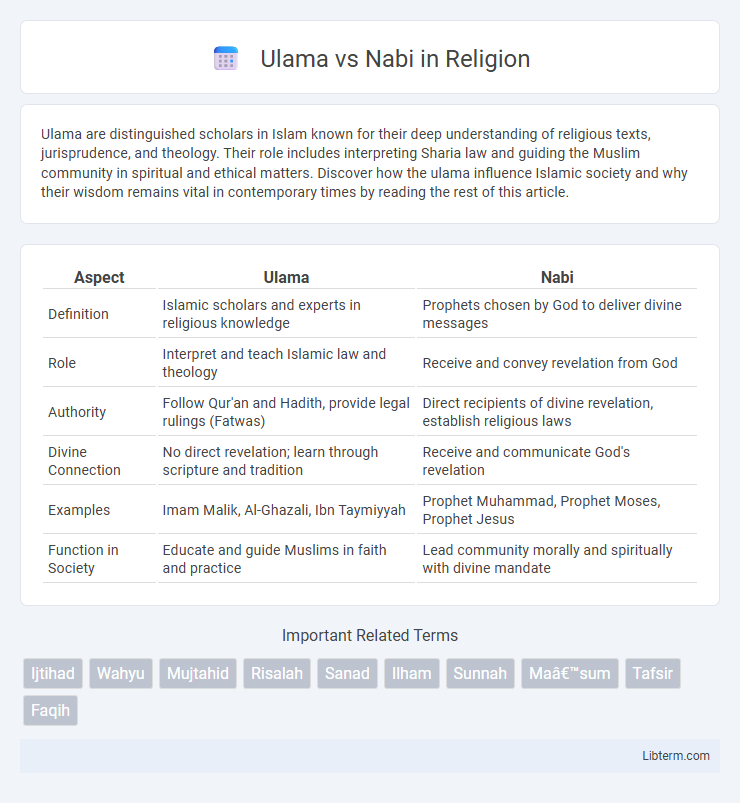Ulama are distinguished scholars in Islam known for their deep understanding of religious texts, jurisprudence, and theology. Their role includes interpreting Sharia law and guiding the Muslim community in spiritual and ethical matters. Discover how the ulama influence Islamic society and why their wisdom remains vital in contemporary times by reading the rest of this article.
Table of Comparison
| Aspect | Ulama | Nabi |
|---|---|---|
| Definition | Islamic scholars and experts in religious knowledge | Prophets chosen by God to deliver divine messages |
| Role | Interpret and teach Islamic law and theology | Receive and convey revelation from God |
| Authority | Follow Qur'an and Hadith, provide legal rulings (Fatwas) | Direct recipients of divine revelation, establish religious laws |
| Divine Connection | No direct revelation; learn through scripture and tradition | Receive and communicate God's revelation |
| Examples | Imam Malik, Al-Ghazali, Ibn Taymiyyah | Prophet Muhammad, Prophet Moses, Prophet Jesus |
| Function in Society | Educate and guide Muslims in faith and practice | Lead community morally and spiritually with divine mandate |
Defining Ulama and Nabi
Nabi refers to a prophet chosen by God to convey divine revelations and guide humanity with fresh, authoritative messages, often marked by miracles and law-bearing missions. Ulama are learned Islamic scholars who interpret, teach, and preserve the religious knowledge based on the Quran and Hadith, ensuring the continuity and application of Islamic law and theology. While Nabi delivers new divine knowledge, Ulama serve as custodians and transmitters of that knowledge within the Muslim community.
Historical Context: Origins of Ulama and Nabi
The term Nabi refers to prophets in Islamic tradition, individuals chosen by Allah to deliver divine revelation, beginning with Prophet Adam and culminating in Prophet Muhammad as the final Nabi. Ulama, meaning "those who have knowledge," emerged historically as religious scholars who interpreted and preserved the teachings of the Nabi through jurisprudence (fiqh), theology, and exegesis (tafsir) after the Prophet Muhammad's era. The Ulama's origins trace back to the early Islamic period, evolving as custodians of religious knowledge and mediators between divine law and Muslim communities.
Roles and Responsibilities: Ulama vs Nabi
Ulama serve as scholars and interpreters of Islamic law, responsible for teaching, issuing fatwas, and guiding the Muslim community in religious matters. Nabi, or prophets, are divinely appointed messengers tasked with receiving and conveying God's revelations, establishing core spiritual and moral teachings. While Nabi introduce new religious laws and commandments, Ulama preserve and explain these teachings to ensure their proper practice and continuity within society.
Authority in Islamic Scholarship
Nabi refers to Prophets in Islam, who receive direct revelation from Allah and hold the highest divine authority in guiding the Muslim community. Ulama are Islamic scholars trained in religious knowledge and jurisprudence, serving as interpreters and transmitters of the Quran and Hadith but do not possess prophetic authority. The authority of Ulama derives from scholarly consensus (ijma) and expertise, whereas Nabi's authority is rooted in divine communication and prophecy.
Revelation: Divine Guidance and Human Interpretation
Revelation in Islam is regarded as divine guidance directly communicated to the Prophet Muhammad (Nabi) through the Angel Gabriel, ensuring the purity and authenticity of the message from God. Ulama, as learned scholars, play a crucial role in human interpretation by analyzing, explaining, and contextualizing the Quranic text and Hadith to apply Islamic principles in various contexts. This dynamic between divine revelation and scholarly interpretation maintains the balance between unaltered sacred text and evolving jurisprudential understanding.
Spiritual Leadership: Differences and Similarities
Ulama and Nabi represent distinct roles in spiritual leadership within Islam, where Nabi refers to prophets who receive divine revelation directly from Allah, guiding believers with new laws and messages. Ulama are learned scholars who interpret and teach Islamic jurisprudence based on the Quran, Hadith, and prophetic traditions, acting as custodians of religious knowledge rather than conveyers of divine revelation. Both play crucial roles in shaping Islamic faith and practice, with Nabi initiating divine guidance and Ulama preserving and explaining that guidance to the community.
Sources of Knowledge: Wahy (Revelation) vs. Ijtihad (Reasoning)
Nabi derives knowledge directly from Wahy (Revelation), which is considered divine and infallible, serving as the primary source of religious authority in Islam. Ulama rely on Ijtihad (reasoning) to interpret and apply Islamic law, using scholarly expertise and context to address new situations within Shariah guidelines. The dynamic between Wahy and Ijtihad highlights the balance between unchangeable divine guidance and adaptive human understanding in Islamic jurisprudence.
Influence on the Muslim Community
Ulama serve as scholars who interpret Islamic law and guide the Muslim community in religious, legal, and social matters, shaping daily practices and community norms through their teachings and fatwas. Nabi, or prophets, hold a foundational spiritual authority in Islam, delivering divine revelations that establish core beliefs and ethical principles followed by Muslims worldwide. The influence of Ulama is ongoing and communal, while Nabi's influence is foundational and scriptural, both crucial in shaping the faith and unity of the Muslim community.
Legacy and Modern Perceptions
Ulama, as Islamic scholars, preserve and interpret the legacy of Nabi, who are regarded as prophets delivering divine revelation. While Nabi hold a unique spiritual status with direct communication from God, ulama contribute to the ongoing application of Islamic teachings through jurisprudence and education. Modern perceptions often emphasize ulama's role in contextualizing religious principles within contemporary socio-political frameworks, whereas Nabi remain central to faith and foundational doctrine.
Conclusion: Distinguishing Ulama from Nabi
Ulama are scholars specialized in interpreting Islamic law and theology, while Nabi are prophets chosen by Allah to deliver divine revelations and guidance. The primary distinction lies in their source of authority: Ulama derive knowledge through scholarly study and reasoning, whereas Nabi receive direct communication from God. Understanding this difference clarifies their respective roles in guiding the Muslim community.
Ulama Infographic

 libterm.com
libterm.com